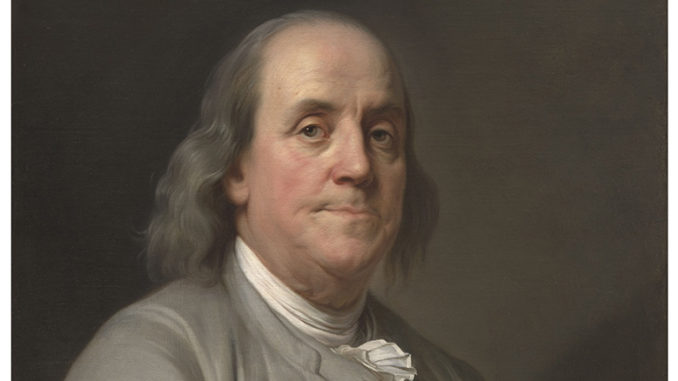 Benjamin Franklin portrait by Joseph Siffred Duplessis, c.1785. Credit: National Portrait Gallery, Smithsonian Institution
Benjamin Franklin portrait by Joseph Siffred Duplessis, c.1785. Credit: National Portrait Gallery, Smithsonian InstitutionBenjamin Franklin might be the most successful polymath to ever walk the planet. He might also be the most complicated.
Renowned documentary filmmaker Ken Burns examines Franklin, the Founding Father whose face adorns the $100 bill, in the two-night, four-hour presentation Benjamin Franklin on PBS April 4-5 at 8pm ET/PT (check local listings).
Scholars and historians weigh in on Franklin as inventor, writer, publisher, humorist, scientist, politician, postmaster, diplomat, worldwide celebrity and revolutionary, revealing a man as contradictory as he was brilliant.
“I think the importance of Ben Franklin is that he was able to connect art and science, able to connect the humanities and the technology,” says Franklin biographer Walter Isaacson. “He cared about everything you could possibly learn about anything, from art to anatomy to math to music to diplomacy.”
Among the innovations credited to Franklin: the lightning rod, bifocal eyeglass lenses, the flexible urinary catheter, the glass armonica musical instrument and the Franklin stove fireplace. He contributed to the advancement of physics, oceanography, demography, meteorology, philosophy and logic, and established the University of Pennsylvania and the Library Company of Philadelphia.
But for all his greatness, Franklin did not live up to the self-evident truth that all men are created equal. Like many of his colleagues, Franklin was a slave owner, and his newspapers profited from advertising in the slave trade. He abhorred slavery, but viewed it as a necessary evil. He supported the clause in the Constitution that counted each slave as only three-fifths of a person, a compromise that allowed the document to be ratified and the United States established. Franklin devoted much of his later public life to abolishing slavery.
Franklin’s ability to settle disputes, not only among people but also in his own beliefs, is an art that seems to have been lost in 21st century American politics. “The greatest thing they had to do as founders and the greatest thing we have to do in our lives is to know when to compromise and when to stand true on principle,” Isaacson says. “Franklin is a great example of that. He usually gets it right. He knows you can’t make a great democracy without compromise.”
“You have in Franklin one of the great reconcilers and therefore one of the greatest compromisers, the greatest diplomat in our history because he can hold two opposing things simultaneously,” Burns says. “It is a brilliant sign of genius that we are so lucky to have had.”

